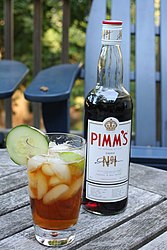Pimm's Cup
 |
|
| Product type | Liqueur |
|---|---|
| Owner | Diageo (since 1997) |
| Country | England |
| Introduced | 1823 |
| Previous owners | James Pimm, et al. |
| Website | anyoneforpimms.com |
Pimm's is a brand of fruit cups, but may also be considered a liqueur. It was first produced in 1823 by James Pimm and has been owned by Diageo since 1997. Its most popular product is Pimm's No. 1 Cup.
Pimm, a farmer's son from Kent, became the owner of an oyster bar in the City of London, near the Bank of England. He offered the tonic (a gin-based drink containing a secret mixture of herbs and liqueurs) as an aid to digestion, serving it in a small tankard known as a "No. 1 Cup", hence its subsequent name. In 1851, Pimm's No. 2 Cup and Pimm's No. 3 Cup were introduced. Pimm's began large-scale production in 1851 to keep up with sales to other bars. The distillery began selling it commercially in 1859 using hawkers on bicycles. In 1865, Pimm sold the business and the right to use his name to Frederick Sawyer. In 1880, the business was acquired by future Lord Mayor of London Horatio Davies, and a chain of Pimm's Oyster Houses was franchised in 1887.
Over the years, Pimm's extended their range, using other spirits as bases for new "cups". After World War II, Pimm's No. 4 Cup was invented, followed by Pimm's No. 5 Cup and Pimm's No. 6 Cup in the 1960s.
The brand fell on hard times in the 1970s and 1980s. The Oyster House chain was sold and Pimm's Cup products Nos. 2 to 5 were phased out due to reduced demand in 1970 after new owners The Distillers Company had taken control. The Distillers Company was subsequently purchased by Guinness PLC in 1986 and Pimm's became part of Diageo when Guinness and Grand Metropolitan merged in 1997. In 2005, Pimm's introduced Pimm's Winter Cup, which consists of Pimm's No. 3 Cup (the brandy-based variant) infused with spices and orange peel.
...
Wikipedia
